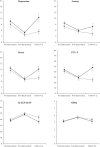Evaluation of an equine-assisted therapy program for veterans who identify as 'wounded, injured or ill' and their partners
- PMID: 30260975
- PMCID: PMC6160012
- DOI: 10.1371/journal.pone.0203943
Evaluation of an equine-assisted therapy program for veterans who identify as 'wounded, injured or ill' and their partners
Abstract
The aim of this study was to evaluate outcomes of an equine-assisted therapy program for Defence Force veterans and their partners across the psychological domains of depression, anxiety, stress, posttraumatic stress, happiness, and quality of life, as well as compare the outcomes of an Individual and Couples program. A non-controlled, within-subjects longitudinal design was utilized with assessment at three time points (pre-intervention, post-intervention, and three months follow-up). Between-subjects analysis with two groups was also conducted to compare the outcomes of the Individual and Couples programs. Participants were recruited from ten programs in 2016 with a total of 47 veterans and partners from both an Individual program (n = 25; veterans only) and a Couples program (n = 22). Outcome measures included the Depression Anxiety Stress Scale-21, Posttraumatic Stress Disorder Checklist for DSM-5, Oxford Happiness Questionnaire, and Quality-of-Life Enjoyment and Satisfaction Questionnaire-Short Form. Paired samples t-tests revealed that within both the Individual and Couples programs, there were significantly fewer psychological symptoms and significantly greater levels of happiness and quality of life at post-intervention compared to pre-intervention. Reduced psychological symptoms were maintained at the three months follow-up for participants of the Couples program only. Independent samples t-tests revealed participants in the Couples program reported significantly less symptoms of depression, stress, and posttraumatic stress disorder (PTSD) at follow-up compared to participants in the Individual program. These results indicate there may only be meaningful benefits for equine-assisted therapy in the reduction of depression, stress, and PTSD symptoms for veterans, if partners are integrated into the intervention.
Conflict of interest statement
The authors have declared that no competing interests exist.
Figures
References
-
- Kang HK, Natelson BH, Mahan CM, Lee KY, Murphy FM. Post-traumatic stress disorder and chronic fatigue syndrome-like illness among Gulf War veterans: A population-based survey of 30,000 veterans. Am J Epidemiol. 2003; 157(2): 141–8. - PubMed
-
- McKenzie DP, Ikin J, McFarlane A, Creamer M, Forbes A, Kelsall H, et al. Psychological health of Australian veterans of the 1991 Gulf War: An assessment using the SF-12, GHQ-12 and PCL-S. Psychol. Med. 2004; 34(8): 1419–30. - PubMed
Publication types
MeSH terms
LinkOut - more resources
Full Text Sources
Other Literature Sources


